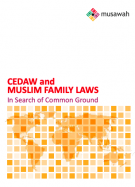CEDAW and Muslim Family Laws: In Search of Common Ground
| Attachment | Size |
|---|---|
| CEDAW-MuslimFamilyLaws | 851.75 KB |

This report, put together by Musawah, outlines the arguments related to Islam made by 44 OIC countries in their CEDAW reporting documents and constructive dialogues with the Committee, and Musawah’s responses based on our Framework for Action.
Excerpt:
The CEDAW research project looks at the approaches of the CEDAW Committee, States parties, and NGOs in addressing family laws in Muslim contexts. There were three main goals of the project:
1. To better understand States parties’ justifications for their inability to promote equal rights, implement existing rights based family laws, and/or reform family laws that discriminate against Muslim women, and the CEDAW Committee’s responses to such justifications;
2. To demystify religious-based objections and constructs based on Islamic teachings, human rights, constitutional guarantees of equality, and social realities in a dynamic and evolving process; and
3. To offer a vision and an understanding of the Islamic legal tradition in a holistic framework that can enable the CEDAW Committee, States parties to the Convention, and NGOs to explore alternative approaches to the direct and indirect use of Islam and Shari‘ah to justify reservations and non-compliance with the Convention with regard to family laws in Muslim contexts.
This report outlines the results of the research and Musawah’s responses to these results. Chapter 2 explains the findings from the research in terms of approaches taken to addressing family laws and practices by the CEDAW Committee itself, States parties, and NGOs. Chapter 3 summarises how the Musawah Framework for Action can be applied to respond to State party justifications for non-compliance and open possibilities for more just and equal Muslim family laws and practices. An understanding of such possibilities can assist in the constructive dialogues between the CEDAW Committee, reporting States parties, and NGOs and their explorations of the links between Islam and human rights law. The report closes with recommendations to the CEDAW Committee for engaging with States parties during the CEDAW review process on issues related to family laws and practices in Muslim contexts.


